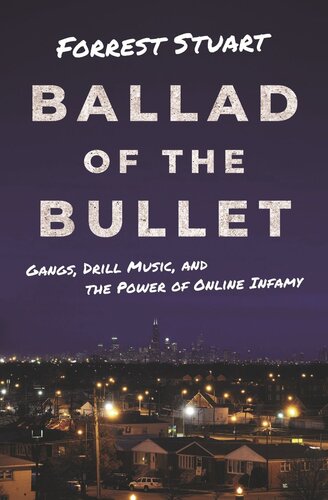

Most ebook files are in PDF format, so you can easily read them using various software such as Foxit Reader or directly on the Google Chrome browser.
Some ebook files are released by publishers in other formats such as .awz, .mobi, .epub, .fb2, etc. You may need to install specific software to read these formats on mobile/PC, such as Calibre.
Please read the tutorial at this link: https://ebookbell.com/faq
We offer FREE conversion to the popular formats you request; however, this may take some time. Therefore, right after payment, please email us, and we will try to provide the service as quickly as possible.
For some exceptional file formats or broken links (if any), please refrain from opening any disputes. Instead, email us first, and we will try to assist within a maximum of 6 hours.
EbookBell Team

4.0
56 reviewsHow poor urban youth in Chicago use social media to profit from portrayals of gang violence, and the questions this raises about poverty, opportunities, and public voyeurism
Amid increasing hardship and limited employment options, poor urban youth are developing creative online strategies to make ends meet. Using such social media platforms as YouTube, Twitter, and Instagram, they’re capitalizing on the public’s fascination with the ghetto and gang violence. But with what consequences? Ballad of the Bullet follows the Corner Boys, a group of thirty or so young men on Chicago’s South Side who have hitched their dreams of success to the creation of “drill music” (slang for “shooting music”). Drillers disseminate this competitive genre of hyperviolent, hyperlocal, DIY-style gangsta rap digitally, hoping to amass millions of clicks, views, and followers—and a ticket out of poverty. But in this perverse system of benefits, where online popularity can convert into offline rewards, the risks can be too great.
Drawing on extensive fieldwork and countless interviews compiled from daily, close interactions with the Corner Boys, as well as time spent with their families, friends, music producers, and followers, Forrest Stuart looks at the lives and motivations of these young men. Stuart examines why drillers choose to embrace rather than distance themselves from negative stereotypes, using the web to assert their supposed superior criminality over rival gangs. While these virtual displays of ghetto authenticity—the saturation of social media with images of guns, drugs, and urban warfare—can lead to online notoriety and actual resources, including cash, housing, guns, sex, and, for a select few, upward mobility, drillers frequently end up behind bars, seriously injured, or dead.
Raising questions about online celebrity, public voyeurism, and the commodification of the ghetto, Ballad of the Bullet offers a singular look at what happens when the digital economy and urban poverty collide.